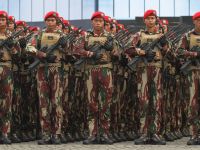The Government of Algeria welcomes foreign investment to help drive, diversify and modernize the national economy.
In 1993, the Government announced an Investment Code that does not distinguish between investments made by foreigners and Algerians. The Government developed a composite regime that provides similar or more attractive incentives than the regimes offered by neighboring states. Algeria's investment code grants new investors:
a three-year exemption from the value-added tax on goods and services acquired locally or imported;
a two-to-five year exemption from corporate income taxes;
an exemption on property taxes;
the right to pay 3 percent customs duties on 30 products (for which duties are normally between 25-45 percent);
the right to pay no more than 7 percent of gross wages as the employer contribution to social security (the standard rate is 24.5 percent).
Encouragement of Foreign Investment
Investment incentives are stronger for companies whose production is export-oriented. For example, enterprises exporting 100 percent of production are entirely tax exempt; they must pay only the 7 percent employer contribution to social security. Firms exporting 50 percent of production receive a 50 percent tax exemption.In March 1995, the Government established an investment promotion agency (Agence de Promotion, de Soutien, et de Suivi des Investissements, APSI). APSI registers investment applications and determines what advantages investors should be accorded under the law. The Government has also established regional investment promotion agencies to assist investors in obtaining land and to facilitate their business with local authorities.
Investment Tax Incentives
In October 1993 the Government lowered the income tax for foreign technical and supervisory personnel. Prior to the decree, most foreign workers faced marginal tax rates that could be up to 70 percent of income earned. Now, foreign company personnel whose monthly salaries exceed AD 80,000 (roughly $1,333) pay a flat 20 percent rate.
Hydrocarbons Investments
The 1986 Law Governing the Exploration, Exploitation, and Pipeline Transportation of Hydrocarbons, and subsequent amendments to it regulate investments in Algeria's hydrocarbons sector. This law grants foreign companies the right to establish joint ventures with the state Hydrocarbons Company, Sonatrach. In December 1991, this law was amended to allow foreign firms to control up to 49 percent in the production of existing oil fields. It also permits foreign investment in natural gas projects and provides for tax incentives to stimulate hydrocarbon exploration.
Capital Markets for Portfolio Investment
In Algeria, no capital market exists outside the banking system. In order to finance part of its deficit, the Government commenced selling bonds in late 1994. In 1996, the central bank began initiating open market operations.
Conversion and Transfer Policies
Algeria's Investment Code authorizes foreign investors to repatriate all revenue earned by hard currency investments within 60 days of such a request.
Dispute Settlement
The Algerian Government is a signatory of the convention establishing the International Center for Settlement of Foreign Disputes. It is also a member of the Multilateral Investment Guarantee Agency (MIGA). International arbitration is permitted under Algeria's Code of Civil Procedure.
Trade Regulations
In recent years, Algeria has taken significant measures to liberalize its trade regime. Its association agreement with the European Union, along with its desire for membership in the World Trade Organization should promote further trade reforms. The import categories that remain subject to restrictions include firearms, explosives, narcotics and pork products.
Trade Barriers
Algeria's procurement practices make minimal use of counter-trade, laws to encourage local production, or non-competitive bidding practices. Although Algeria's customs operations are being modernized, in many instances administrative procedures remain arduous. Algerian imports are subject to payment of ad valorem customs duties ranging between 3 percent and 40 percent. A value-added tax of 7, 14, or 21 percent is levied on imports, which are also subject to another import tax, the Taxe Specifique Additionnelle (TSA). This tax ranges from 20 percent to 110 percent. While the VAT is based on the import's purchase price plus customs duties, the TSA excludes the latter in its calculation, and applies primarily to luxury goods.
Services Barriers
Algeria's Post, Telephone, and Telecommunications Ministry maintains a monopoly on all telecommunications services. The production, importation, and distribution of equipment are open to the private sector. In the second half of 1999, the Algerian Stock Exchange opened for trading activities. The Exchange, which has a weekly trading session, only lists several companies.
Import Licenses
Import licenses are not required, but the importation of certain luxury goods remains restricted because of the state-owned bank's unwillingness to provide all importers with the necessary documents to clear such items through customs.
Export Controls
Algeria's authorities have succeeded to remove virtually all export restrictions. The main exceptions include palm seedlings, sheep, and historical and archaeological artifacts. The Government is encouraging non-hydrocarbon exports, and has established the Algerian Export Insurance and Guarantee Company.
Temporary Entry
Equipment and machinery brought into Algeria temporarily for the purpose of a specific project or exhibition are exempt from payment of customs duties and taxes. In order to obtain such a waiver, importers must complete a customs form, which they must subsequently present to the customs authorities when the goods are re-exported.
Labeling Requirements
All imported products must be labeled in Arabic. Imported drugs must receive authorization from the Ministry of Health and Population prior to being distributed locally. Such drugs must have been marketed in their country of origin prior to being sold in Algeria. Algeria's Customs Service has imposed more stringent controls over food imports, and regulates the minimum validity period of imported foodstuffs.
Free Trade Zones/Warehouses
In April 1997, the Government designated the site of Bellara (in the Jijel district, near the port of Djendjen) as a free trade zone. Foreign investors in this zone are exempt from taxes and customs duties.
Membership in Free Trade Arrangements
In 1989, Algeria, Tunisia, Morocco, Mauritania, and Libya formed the Arab Maghreb Union (UMA). The countries agreed on a free trade agreement, but no timetable has been established. Moreover, international sanctions imposed on Libya have rendered the UMA impotent. In 1998, Algeria finalized an association agreement with the European Union.© 2000 Mena Report (www.menareport.com)







